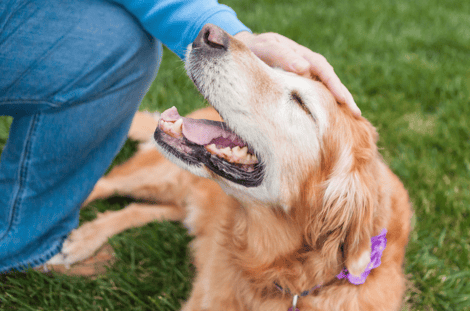The Golden Years: What To Expect as Your Dog Ages

Is your dog reaching the golden years?
Sadly, our dogs often have shorter lives than we do. Caring for a senior dog involves understanding that their activity and health needs change. However, many dogs can live long, happy, healthy lives when their owners are on the lookout for potential issues like obesity and cancer.
When is your dog considered a “senior”? And what can you expect as your dog ages?
When Is Your Dog a Senior?
Dogs are considered senior when they reach the final 25% of their average life span. Of course, calculating dogs’ life span is not an exact science (and it is not as simple as calculating 7 human years per dog year). But generally, small dogs live longer than large ones.
The American Kennel Club estimates the following life spans. Keep in mind that these are averages.
- Small or toy breeds (less than 20 pounds): 8-11 years
- Medium-size dogs (20-50 pounds): 8-10 years
- Large dogs (50-90 pounds): 8-9 years
- Giant breeds (more than 90 pounds): 6-7 years
As your dog approaches the later stage of life, you’ll need to pay extra attention to their health needs to make sure they live as long — and as well — as possible.
Keeping Senior Dogs Healthy
One of the best things you can do for your aging dog is to visit your veterinarian regularly and watch for signs of illness. If you stay on top of dental care, parasite prevention, and nutrition, your dog has a better chance of living past the average age.
The American Veterinary Medical Association (AVMA) has the following recommendations for senior pet care.
- See a veterinarian at least twice a year.
- Make sure your dog is eating a nutritious diet formulated for their changing body (it doesn’t have to be the most expensive food on the shelf).
- Watch out for weight gain; overweight pets don’t live as long.
- Keep your dog on preventive medicines for fleas, ticks, and parasites.
- Make sure your dog is vaccinated.
- Keep your dog active, and adapt their environment for changing mobility.
- Make sure your dog is spayed or neutered; they are less likely to get certain kinds of cancer.
Common Senior Dog Health Issues
Cancer is the cause of death for more than half of dogs, so it is important to be on the lookout for signs that your dog may have cancer. Dogs don’t have a way to tell us when something hurts, so it’s our job to watch for these issues:
- Swelling in their abdomen
- Trouble breathing, eating, or swallowing
- Bleeding from the mouth, nose, or other areas
- New lumps, bumps, or discolored spots
- Diarrhea or throwing up
- Loss of appetite or weight loss
- Limping, swelling, or spots that hurt when you touch them
After cancer, other common health problems for senior dogs are heart disease, kidney, liver, or urinary tract disease, diabetes, joint or bone disease, overweight or obesity, and vision or hearing loss.
Like people, older dogs may have trouble hearing and seeing as well as they used to. You can help older pets by removing obstacles and not moving your furniture around too much so they can still feel their way around.
Arthritis in Dogs
Some senior pets get arthritis, and certain breeds are more prone to joint issues. One of the best ways to prevent arthritis is to make sure your pet stays at a healthy weight.
If your dog is less able to hop into the car, climb the stairs, or run, they might be hurting from arthritis. They may get grumpy with other dogs or people, sleep more, and play less.
There are some medications your vet can prescribe to help them, and you can also make accommodations to your home, like adding ramps, orthopedic beds, and feeding platforms.
Behavior Changes
As pets age, they can experience senility, which is also called cognitive dysfunction. Signs that your dog is experiencing cognitive dysfunction can be reacting to new or loud sounds, barking, aggressive or protective behavior, anxiety, confusion, wandering, peeing or pooping in the house, sleeping more, or repeating actions.
Some of these changes are simply part of the aging process, but if you talk to your veterinarian about them, they may be able to help by changing your pet’s diet.
Tips for a Longer Life
The fact is, some health problems are preventable, while others aren’t. Every dog is different, but pet parents who follow this advice are doing all they can to ensure a happy, healthy life.
- Feed your dog a healthy, balanced diet.
- Help them maintain a healthy weight.
- Exercise with them (it’s good for you, too).
- Keep their teeth and gums healthy.
- Take them to the vet for regular checkups .
- If you notice anything unusual, call the clinic.
Saying Goodbye
Even when we do all we can for our aging pets, they will eventually die. If and when to have a veterinarian perform euthanasia (a humane death) is a very personal decision, but most pet parents feel better if they have an end-of-life plan in place.
Some veterinary care providers will come to your home to perform euthanasia so your pet can spend their last moments with their family members in a comfortable and familiar place. Understandably, this is a more expensive option than having the procedure performed at a veterinary clinic.
If you are a low-income pet parent in northeast Ohio, euthanasia assistance is available.
As always, Veterinary Care Vouchers provided by One Health Organization are available for eligible pet parents to help with up to $250 per year of veterinary care.
Let’s do all we can to make sure our beloved dogs live their best — and longest — lives.

